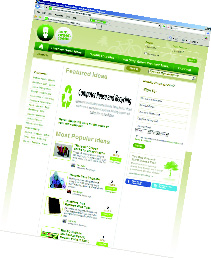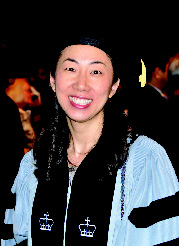A Green Idea
Two TC alumnae launch a Web clearinghouse where eco-conscious consumers can share information on a range of green products
It started, as good things often do, with a baby.
Three years ago, in anticipation of becoming an aunt, Julie Youm, (M.A. ’05, Ph.D. ’10), was helping her sister, Robyn, (M.A. & M.S., ’01), and brother-in-law, scour the Web for everything from organic cotton onesies to BPA-free freezer trays. The trio had a brainstorm: What if there was a single site where eco-conscious consumers could share information on a range of green products?
“I’ve always been interested in trying to make technology more intuitive and useful for people,” says Julie, whose concentration at TC was in Cognitive Studies. (Robyn’s was in Secondary School Science Education.)
After two years of development, www.sumgreenideas.com was born early in 2010. The site offers consumer advice, recycling suggestions and more, in product categories ranging from babies and beauty to electronics and exercise. It features a To-Do List that allows users to keep track of ideas and products they find while using the site. A companion iPhone app for access to itemized lists during trips to the store is now in the works.
“We wanted to make it easy for people to incorporate green thinking into their daily habits by having an organically-grown database of products,” says Julie Youm.
Although there are similar resources on the Web, Sum Green Ideas, which offers a “submit your own idea” feature, is more collaborative. “We encourage users to post information, too, so that the site is more vital and interactive,” Youm says.
As an added incentive to visit and buy green, consumers can purchase products on the site via www.amazon.com and know that Sum Green Ideas will donate a percentage of the proceeds to the Arbor Day Foundation, a non-profit dedicated to replanting the nation’s forests.
Still, for Youm, who now lives in Irvine, California with her husband, the site isn’t about being preachy. Visitors can browse items within levels (beginner, intermediate, advanced) that represent how costly or hard it may be to complete or purchase a product/idea. Countertops made of recycled glass might not be feasible for everyone’s budget, for example, whereas, say, bamboo floors are more affordable. That reflects Youm’s own approach to eco-living: “If I can do it, and I can afford it, I’ll try it.”
To contribute to the community at Sum Green Ideas, visit www.sumgreenideas.com.
Published Wednesday, Oct. 13, 2010


